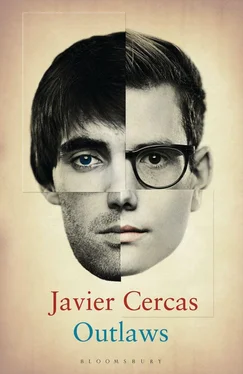‘I remember very well the first conversation I had with him. It was in the prison interview room, a minuscule little room where lawyers met with their clients, something I did frequently (“You visit the clients at least once a week,” Higinio Redondo used to repeat when I first started working for him. “Remember we’re the only hope these rogues have.”). The interview room was to the left of the entrance; two rows of bars with a pane of glass between them divided it down the middle: on this side, up against the wall, was a desk and chair; on the other side there was an identical space, the only difference being the prisoner didn’t have a desk and that, instead of sitting facing the wall, he sat facing the lawyer, looking towards the double bars and glass. I didn’t have to wait long before Zarco appeared. As had happened the previous afternoon with Tere, I recognized him straight away, but I wasn’t recognizing the quinqui I’d last seen on the way into La Devesa Park, rolling about with a couple of cops, but the one who since then had illustrated the comings and goings of Zarco in newspaper photos and on cinema and television screens.
‘When he saw me, Zarco gave the hint of a tired smile and, as he sat down he urged me to do the same with a gesture. I did. What’s up, Gafitas? he said in greeting. Long time no see. His voice was husky, almost unrecognizable; his breathing was gravelly. I answered: Twenty years. Zarco smiled fully and gave me a glimpse of his blackened teeth. Fuck, he said. Twenty years? Twenty-one, I specified. He shook his head seeming somewhat amused and a bit overwhelmed. Then he asked: How are you? Fine, I answered. Yeah, I can see that, he said, and, like in the old days, his eyes narrowed until they became a couple of inquisitive slits. He’d put on weight. He seemed to have shrunk. The flesh of his cheeks and chin looked soft and old, though his arms and torso gave the impression of conserving, beneath the shirt and sweater that covered them, some of their old vigour; he had much less hair and it was almost grey and badly cropped, but still parted in the middle; his skin looked rough, unhealthy, mouse-coloured; his eyes were still very blue, but they were dull and reddened, as if he had conjunctivitis. I asked: How are you doing? Fucking great, he answered. Especially now that I know you’re going to get me out of here. Is the prison so bad? I asked to keep the dialogue going. Zarco made a face that looked bored or indifferent, pushing his shirt and sweater sleeves up to his biceps inadvertently showing me — my first impression had been false — the soft and old flesh of his arms and forearms, covered in scars; actually, his whole body as far as I could see was covered in scars: his hands, wrists, the edges of his lips. The prison’s not bad, he answered. But it’s a prison: the sooner you get me out of here, the better. I don’t know if it’s going to be that easy, I warned him; I continued: For the moment Tere told me about a trial for something that happened in the Brians prison. Yeah, he said. But that’s just for the moment; then comes all the rest. Be patient, Gafitas: you’re going to end up sick to death of me.
‘That’s how our re-encounter began. Zarco soon started talking about himself, as if he urgently needed to bring me up to date. He told me that over a year ago he’d fallen out with his last lawyer and with his family or with what was left of his family, and since then he hadn’t had a lawyer and hadn’t spoken to his family, even though some of them lived in Gerona, including his mother and two of his brothers. He also talked about Tere and María. What he said about Tere mustn’t have been relevant, because I don’t remember it; however I well remember something he said about María. Don’t pay much attention to her, he advised me, in a tone somewhere between ironic and disdainful. María just wants to be in the magazines. That’s what he said, and I was surprised — and not just because I was there precisely because I’d paid attention to María — but I didn’t say anything. As if to compensate him for his confidences I told him a couple of things about me, in which he didn’t even pretend to show interest, and then asked him about our mutual friends. I was surprised that he had news of all of them, but not that they were all dead, with the exception of Lina — who Tere apparently saw every once in a while — and Tío — who was still living with his mother in Germans Sàbat and still in his quadriplegic’s wheelchair. Jou and Gordo, he said, had overdosed on heroin, Jou just after he got out of prison, where he had spent a couple of years for the bank robbery of the Bordils branch of the Banco Popular, and Gordo three or four years later, when he seemed to have cleaned up and was about to marry Lina. Chino had also died of an overdose, in the washroom of the Babydoll, an Ampurdán brothel, a relatively short time ago, and Drácula had died of AIDS not too long ago either. Colilla’s death, however, had never been entirely cleared up: according to some he’d fallen down the stairs of the building where he lived in Badalona one night; according to others he’d tried to get out of a drug debt and his creditors had beaten him to death and then made it look like he’d fallen down the stairs by accident.
‘That, more or less, was that for personal matters; from that point on Zarco changed his tone and the subject. He began by summing up his prison record in his own way: although he still had more than two decades’ worth of sentences hanging over his head, Zarco considered that within a year he could be eligible for conditional release, which would allow him to spend his days outside the prison, and within two or three at the outside he could be free. I was optimistic about his future (more optimistic at least than I had been before studying his prison record), but not that optimistic; even so, I didn’t raise any objections to his predictions or make the slightest commentary. It’s true that Zarco didn’t ask for my opinion either: he just went on talking about the first trial pending, the trial for which Tere and María had asked for my help. From the start he flatly denied having assaulted the Brians prison guards who had reported him. I didn’t beat them, he said. They beat me. Are there any witnesses to that? I asked. Witnesses? he asked. What witnesses? Some other inmate, I answered. Zarco laughed. Are you crazy, Gafitas? he said. You think they’re going to beat me up in front of another inmate? They beat me up in my cell, behind everybody’s back; I just tried to defend myself. That’s what happened. How many were there? I asked. Four, he answered, and listed their names by memory; pointing to the papers I had on the desk, he added: They’re the same ones who filed the complaint. I nodded. And the others? I asked. I mean the other guards. Did they see their colleagues beat you up? Would they be prepared to testify in your defence? Now Zarco stared at me, clicked his tongue, looked away and seemed to think it over for a moment, stroking his hollow, badly shaven cheeks; then he looked back at me, this time with an air of superiority. When have you ever seen one jailer testify against another? he asked. Look, Gafitas, if you’re going to be my lawyer you have to know a couple of things. And the first one is that everyone in jail wants to fuck me over, but the ones who most want to fuck me over are the guards. All the fucking guards in every fucking jail. Got that? I kept quiet; he went on: And you know what? Maybe they’re right: if I were them I’d want to fuck me over too. I interrupted him, feigning innocence I asked him why they would want to fuck him over. Because I fuck with them, he answered. And because they know I plan to keep fucking with them, so they don’t fuck me over. That’s why. And that’s why they make up stories like the one from Brians, except that this time it’s not going to do them any good because we’re going to take it apart. Yes or no, Gafitas?
Читать дальше












